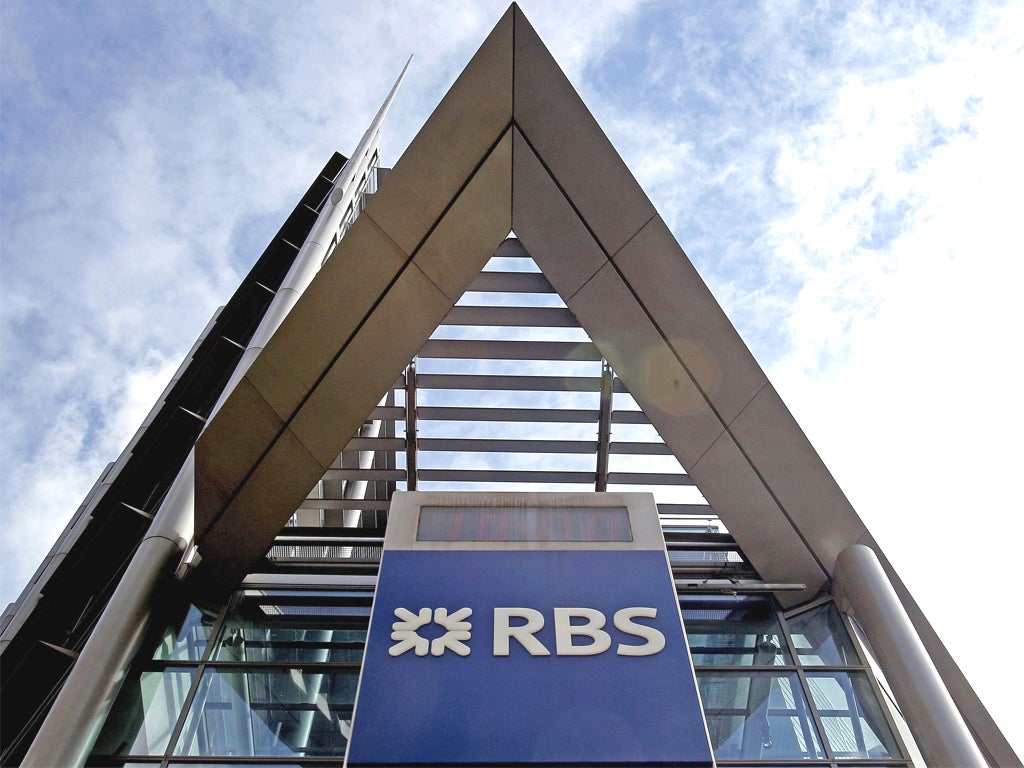Taxpayers foot the bill for loss-making banks' lobbying

Your support helps us to tell the story
From reproductive rights to climate change to Big Tech, The Independent is on the ground when the story is developing. Whether it's investigating the financials of Elon Musk's pro-Trump PAC or producing our latest documentary, 'The A Word', which shines a light on the American women fighting for reproductive rights, we know how important it is to parse out the facts from the messaging.
At such a critical moment in US history, we need reporters on the ground. Your donation allows us to keep sending journalists to speak to both sides of the story.
The Independent is trusted by Americans across the entire political spectrum. And unlike many other quality news outlets, we choose not to lock Americans out of our reporting and analysis with paywalls. We believe quality journalism should be available to everyone, paid for by those who can afford it.
Your support makes all the difference.Britain's two state-owned banks have hired seven separate lobbying and public affairs companies at a cost of hundreds of thousands of pounds a year, The Independent has learnt.
The Royal Bank of Scotland (RBS), which is 83 per cent owned by taxpayers, paid six firms last year despite losing more than £750m in six months. It also employs its own team of internal corporate lobbyists to influence ministers.
Lloyds Banking Group, which is 41 per cent owned by the Government, retained two lobbying companies. It reported £3.3bn of pre-tax losses in the six months to June. Neither RBS nor Lloyds would specify exactly what the firms were doing on their behalf, but the extent of their use will fuel concerns that the banks are using taxpayers' money in an attempt to water down banking reforms and planned caps on executive pay.
It comes despite a ban by ministers on other recipients of taxpayers' money hiring public affairs firms to lobby other arms of Government.
The Communities Secretary, Eric Pickles, has said: "Taxpayer-funded campaigns conducted by private lobbying firms mean... public policy is weakened and public discourse becomes a soundbite battle. Lobbyists are not subject to Freedom of Information or transparency rules. Democracy is at its strongest when it is cost-efficient, open and transparent, and lobbying on public money undermines it." He has also said that taxpayers did not want public money spent on "loudhailer propaganda".
Last night, Downing Street sources said it "seemed ridiculous" for banks such as RBS and Lloyds to be spending shareholder money on PR consultants. They insisted, however, that doing so did not buy influence with ministers. "These firms might try and lobby us to do things but that does not mean that we do them," one No 10 source said.
Tamasin Cabe, of the Alliance for Lobbying Transparency, described the revelations as "offensive" while Labour said they were "outrageous".
"It is hard to explain how a state-owned company should need lobbyists to lobby the state," said Jon Trickett, the shadow Cabinet Office minister. "They should be spending their money providing better services for customers."
The records of banks' hirings are contained in client records kept by the public affairs industry. RBS retained the services of APCO, Finsbury, Bell Pottinger and Lansons in 2010. Ulster Bank, which is wholly owned by RBS, employed Cherton Enterprise. Lloyds hired Burson Marsteller and College Public Policy – although the second contract has now been replaced with a contract with the firm Hanover.
RBS's use of PR companies is far greater than its private banking competitors. HSBC and Barclays each employ two firms, while Santander retains three.
RBS unveiled plans yesterday to pay the head of its troubled investment banking division £4.3m in April despite the company's share price falling by half in a year.
Last month, The Independent revealed that senior bank executives met or telephoned Treasury ministers nine times in the weeks after Sir John Vickers published his proposals on how to prevent another banking crisis. The Chancellor, George Osborne, personally met the RBS chief executive, Stephen Hester, and Antonio Horta-Osorio of Lloyds on separate occasions in the days before the release of the Vickers report. Robert Jenkins, a member of the new super-regulator, the Financial Policy Committee, has also accused banks of implementing a "lobbying strategy that exploits misunderstanding and fear" to thwart banking reform.
Later this month, the Government is due to bring forward plans to regulate the lobbying industry. At the moment, most large agencies sign up to a voluntary register detailing who they work for, but there is no record of internal lobbyists employed by companies or industry groups, or who they are lobbying. Agencies are also under no compunction to publish details of all their clients – and there is a suspicion that the names of some clients are being withheld from public scrutiny. However, it is uncertain how far the Government will go because it has been under pressure from the lobbying industry itself to water down the proposals. A spokeswoman for RBS said it was unable to provide specific details of what its lobbyists did or how much they were paid. But she added: "Like most large companies, RBS and its subsidiaries employ consultants for communications advice. We do not, however, employ any third parties to lobby politicians or government on our behalf.
"We have not conducted any campaigning against regulatory reform and when we have had concerns on the proposals, we have stated these publicly and on the record."
A spokesperson for Lloyds said: "As a majority-privately-owned company, all of our public affairs activities are completely in line with the codes and requirements that apply to all FTSE-listed companies."
Join our commenting forum
Join thought-provoking conversations, follow other Independent readers and see their replies
Comments